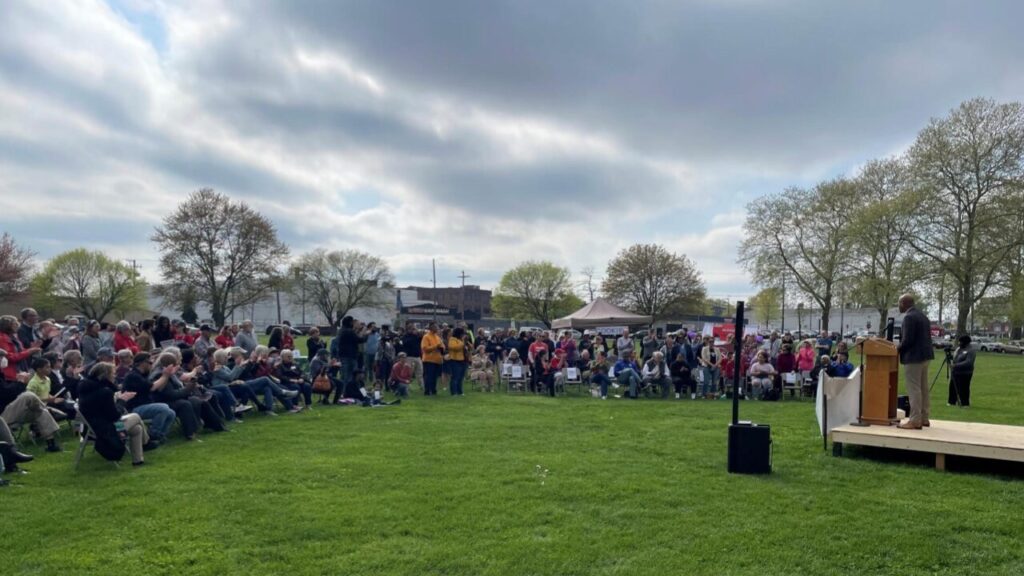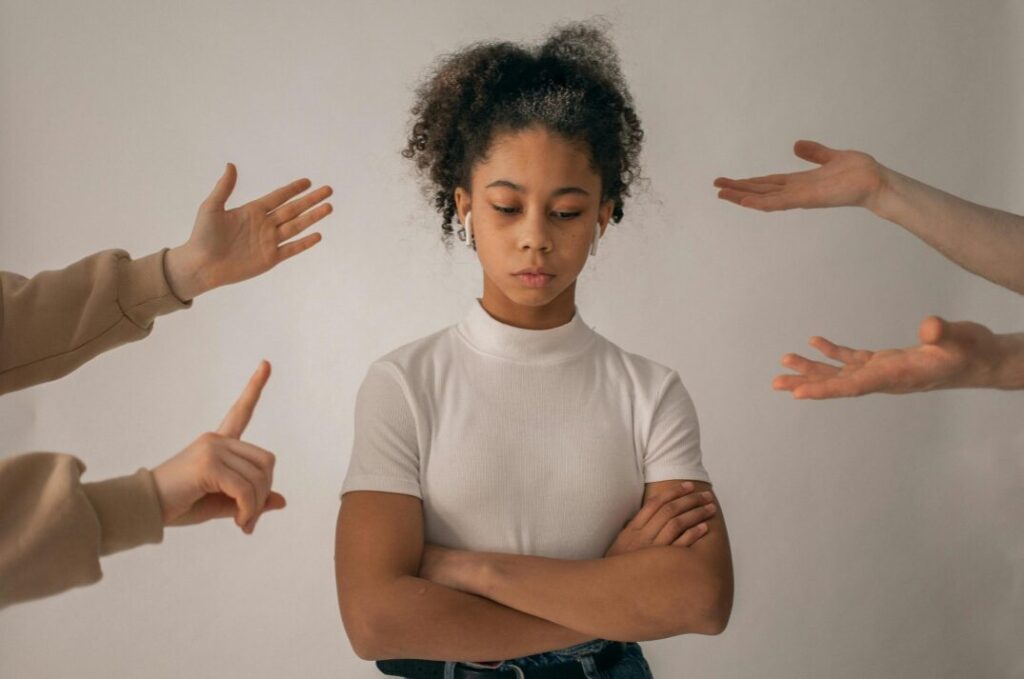Always Room
I want to go back to that first scripture (1 John 4:7-13) about love because a lot of times when we talk about love, I think we’re a little confused about what kind of love are we talking about?
It’s not just the feeling that we have. It’s not a romantic type of love. It is a caring type of love. But more importantly, it’s a verb. It’s an action. It’s love. Love is put into action. Loving someone else means you do something about it. Which is why I talked about the caring cart and what we have done in collecting these personal care items. You love somebody by doing something.
I think it is just that easy and that difficult because we don’t always know what loving someone looks like. What action is a loving action? But I’ve said in the past, and I’m going to repeat that. I want us to hold this question.
What is the most loving thing I can do?
If that is the question that we hold in our being every day. Then when we run into a situation or we encounter someone, we can bring that question to mind. What is the most loving thing I can do right now? We will get an answer. We will know what to do. If we listen to our hearts, God will tell us what the most loving thing to do is.
On Thursday, April 18th, the most loving thing I could do was go to this rally called Justice for Education at J. P. McCaskey.
Because the point of the rally was to help show our legislators that we care about this issue. Now I’m going to give you a little bit more information about the issue if you haven’t been following it in the news.

Our system for funding education in Pennsylvania has us ranked 45th out of 50. Even more importantly, last spring a commonwealth court ruled that it is unconstitutional according to the Pennsylvania Constitution. We have to change the way we fund education in Pennsylvania because not every child in Pennsylvania receives the education that they need. That’s has been proven.
So, now it is dependent on our legislators on how to change that. Last summer, there was a Basic Education Funding Commission that had a series of meetings across the state to understand ideas. It was half Republican, half Democrat. This is bipartisan. They went back to Pennsylvania and they have come out with a new plan.
What we are saying is you need to vote for this plan. The plan is in the 2024-25 budget and you need to vote for it. You need to codify it. You need to make it law so they don’t just do it this year, but they continue to do it because it’s a seven year plan. So doing the first year of a seven year plan and not doing any more isn’t really going to get us far. We got to keep doing the plan until we get to where we should be with that. That’s the education justice issue.
Now you might be thinking, social justice. Do you know what my schedule looks like?
I’ve got enough going on in my life right now. I want to affirm that we do have enough going on in our lives right now. I know that. I know that a lot of us are overwhelmed. That we are filled, we feel like we’re pulled in so many different directions by so many different priorities and we don’t know what to do with that.
In the midst of all of that, I want to say, it’s also matters that we pay attention to what’s happening in our world, to how other people are being treated. We need to do whatever we can. Maybe you can’t go to a rally, but you can be kind to the next person you meet, or act in a loving way.
I also want to name that we talked about the fact that social justice and compassionate justice is part of who God is calling us to be.
When we talk about “what does home look like?”, Home is a place that accepts you, that recognizes you and affirms your humanity. Because at the end of the day, that’s what it’s about.
It’s about looking at another person, regardless if they are like you or not. Regardless if they have the same political position as you or not. That’s really big right now. Recognize their humanity. We all still want to be respected. We all still want to belong and feel that we matter. We all want that.
So here comes our story today from Acts. Philip and the eunuch.
This is a social justice story. Did you know that? It’s a huge social justice story. Philip and the eunuch are both in places they don’t belong. Philip and the disciples have been chased out of Jerusalem because the Pharisees are out for them. They want to squash this Christian thing that’s going on and the Romans want to squash it because they thought if they killed the leader the movement would die and it didn’t. So now they got to go after the next level.
The Apostles have left Jerusalem and Philip is going around all different kinds of places. The spirit, which is what happened at the end of this story, the spirit just picks him up and puts him somewhere else. But for this story, he’s on the road from Jerusalem to Gaza.
Now I want everybody to just take a deep breath, because we know something about the road from Jerusalem to Gaza right now, do we not? I hope you do. I hope you’re paying enough attention to know what’s going on in Gaza and Israel. That’s the road they’re on.

Philip hears this eunuch reading. That means he is emasculated. The question can be asked, “Why is that the feature that is brought out in this scripture?” He’s an Ethiopian. It also tells us that he’s the treasurer. He mines the treasury of the queen. He’s in a chariot. That’s why I chose this picture, this image of it, because he’s in a different class than some others. He has privilege. He has a driver because he is in a chariot, and he may even have a bodyguard. Because he’s that important.
The part that they tell us in this story is that he’s a eunuch. He’s been emasculated. To the Hebrews, that means he is not a man. Because he cannot procreate, because his body has been altered, he is not welcome in the temple. So even though he’s been to Jerusalem, he would not have been welcome. He needed to stay out with all the other people, with their leprosy, their bleeding, and the other things that made them unworthy of walking in.
But he wants to learn. The piece that we need to pay attention to is what Philip does. Philip doesn’t care. Philip doesn’t ask about any of that. He doesn’t talk about the fact that he’s a eunuch. He doesn’t say, “Hey, since you couldn’t get into the temple, I’ll help you out.” He just says, Do you know what you’re reading? The guy says, Essentially, no, I need help, and invites him into the carriage, and Philip goes.
Then they find water, and even more than teaching him, oh my gosh, he baptized him. That means he is part of the body of Christ. He is welcome. Room has been made for him. Even though the religious authorities would have shun him, even though he was everything that they said no to, he was welcomed and baptized into the family and God blessed it.
It’s very interesting. Something else I learned when I was doing my research is there is a verse in Matthew 19:12. You want to read it because it never comes in the lectionary. We never read that verse. We read the verses before it and after it, but we never read that verse, and it’s all about eunuchs. Eunuchs that are born as eunuchs. Eunuchs that are emasculated by someone else’s choice and eunuchs who allow it so that they can be part of the kingdom. You need to think about that in all of our things that we do.
Because we are called, as a congregation, to make sure that everyone feels welcome. That’s what we say. Inclusive refuge, Anyone who is powerless or afraid, Anyone who needs refuge is welcome here.

This isn’t easy. We’re going to make mistakes. I picked this picture on purpose because you see what’s going on in this picture? All the white people are making a demand of the black woman and we’re very good at that. We’re very good at expecting them to fill our expectations without finding out what they need or who they are.
But we are called to compassionate justice. So, what I want to suggest is that I think right now with our congregation, we are at a point where it’s time to set up a justice team. This is what I would like the team to do. I would like the team to interview the congregation. Because I want to know. I want us to know. What keeps you up at night? What wakes you up at three o’clock in the morning? Which issue? Because there are a lot of social justice issues on the table right now. The education justice is just one issue, but there are so many. So I want to find out what is the number one issue in our congregation?
Then we’ll decide how best to work in that area. What difference can we make in our Lancaster community? Because I think we can make a difference in our Lancaster community. But we need to do our research first. I’ve learned from the organizers that you start with research meetings. So we need to do an internal research meeting first and find out what our priorities are. Then I have resources that I can connect us to in the community so that we can work. We’re going to work with people who are already doing the work. So that we can make an impact in this community. Because we want to. This is not just about coming in here to serve us. We want to make a difference with people. I heard that during our discernment process for the vision and mission. It matters why we’re here.
Reverend Roland Forbes, some of you may know Rev. Forbes from Ebenezer Baptist, he always says, “What would happen if your church disappeared? If your church disappeared, would the community notice?” And we want the community to say, don’t disappear. We need you. You are vital in this community. That’s our call to action. So, if you are interested in being on a social justice team, then come talk to me and we’ll put that team together because we make the way by walking.
We’ll make mistakes. We’ll fumble, we’ll stumble, but we can make a better community and we can share love with others.
The story of Philip and the eunuch, in several ways, an outsider, expresses the inclusive love of God for all. All are invited to come home to God because love is simply part of our nature. Love is from God. The invitation is as simple as it is every time we make it. When you endeavor to love your neighbor and live in peace with each other, there’s always room for you, no matter who you are or how you think you don’t fit in.